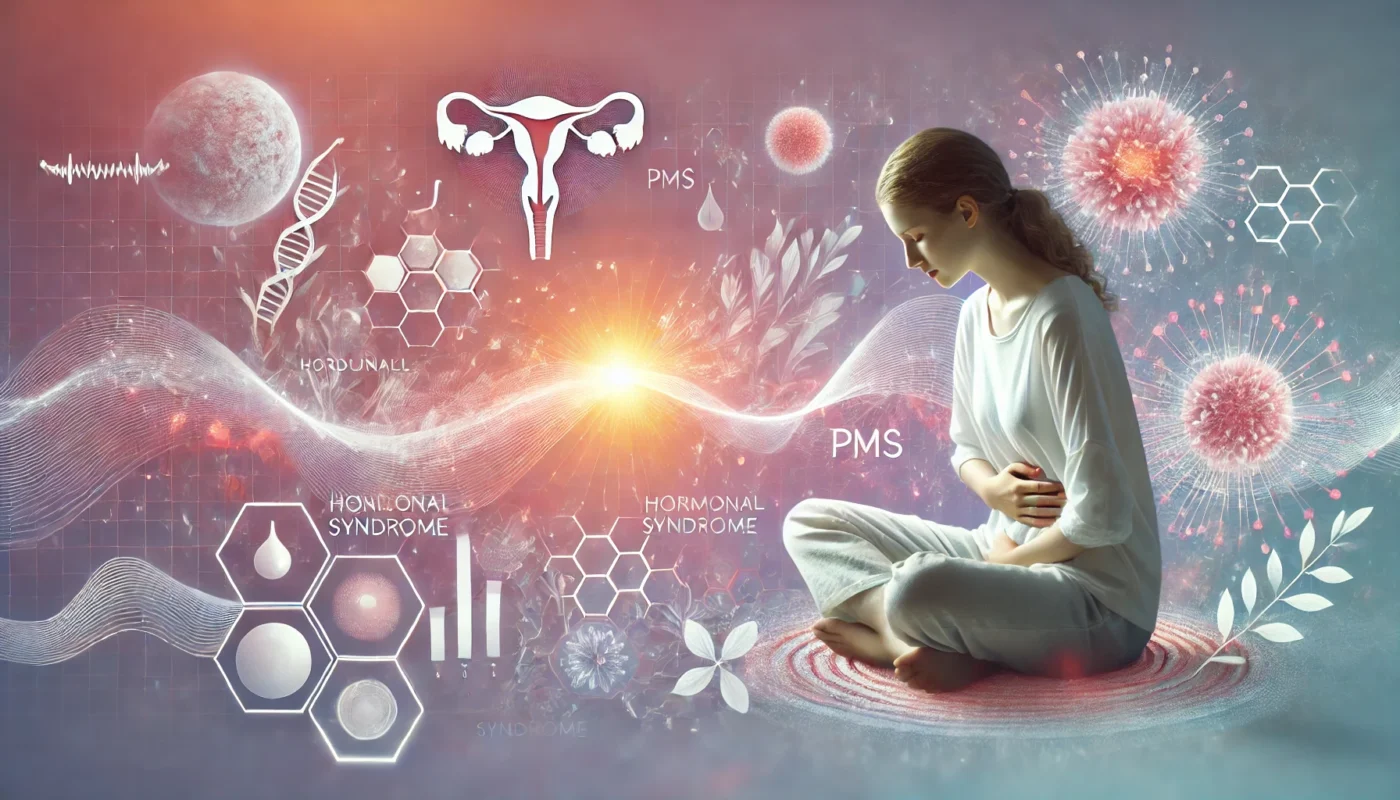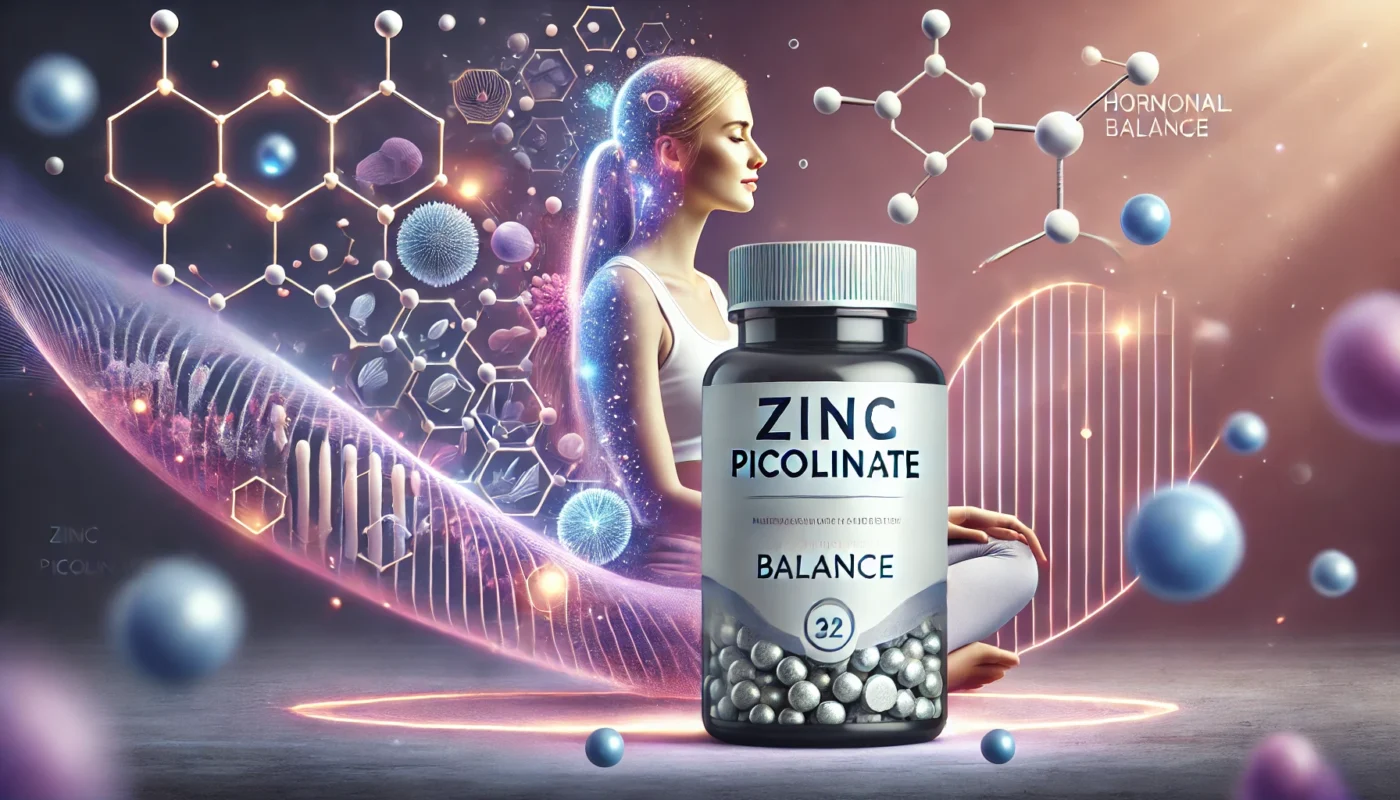Premenstrual syndrome (PMS) affects up to 75% of menstruating women, with symptoms ranging from mood swings and irritability to bloating and cramps. While the severity of PMS varies, its impact on daily life can be significant, prompting many to seek effective remedies. Traditional solutions such as pain relievers and hormonal therapies address symptoms but often fail to tackle the underlying imbalances that contribute to PMS.
Zinc, an essential trace mineral, is gaining attention for its ability to alleviate both the emotional and physical symptoms of PMS. Zinc picolinate, a highly bioavailable form of zinc, offers targeted benefits for managing PMS by regulating hormones, reducing inflammation, and supporting overall reproductive health. This article explores the science behind zinc picolinate’s role in PMS relief and why it stands out as a natural, comprehensive approach to symptom management.
You May Also Like:
Zinc Picolinate for Polycystic Ovary Syndrome (PCOS): A Potential Solution
How Zinc Picolinate Improves Fertility in Women: What Science Reveals
Zinc Picolinate for PMS Relief: Beyond Traditional Remedies is an original (HSLHealing) article.
Understanding PMS and Its Symptoms
PMS encompasses a range of symptoms that occur during the luteal phase of the menstrual cycle, typically 1–2 weeks before menstruation. These symptoms are thought to arise from hormonal fluctuations, particularly in estrogen and progesterone, as well as imbalances in neurotransmitters like serotonin.
Common PMS Symptoms Include:
- Mood swings and irritability
- Anxiety or depression
- Bloating and water retention
- Breast tenderness
- Fatigue
- Cramps and back pain
While the exact cause of PMS is not fully understood, research points to hormonal imbalances, inflammation, and nutrient deficiencies as contributing factors.
The Role of Zinc in PMS Relief
Zinc is a versatile mineral that plays a critical role in supporting hormonal health, neurotransmitter regulation, and immune function—all of which are relevant to PMS symptom management. Its benefits include:
- Regulating Hormonal Fluctuations:
Zinc influences the production and metabolism of estrogen and progesterone, helping maintain hormonal balance during the menstrual cycle. - Reducing Inflammation:
Zinc’s anti-inflammatory properties alleviate physical discomfort such as cramps and bloating. - Supporting Neurotransmitter Activity:
Zinc is essential for the synthesis and function of serotonin and dopamine, which regulate mood and reduce PMS-related anxiety or depression. - Improving Energy Levels:
Zinc supports mitochondrial function and cellular energy production, combating PMS-related fatigue. - Alleviating Cramps:
By regulating calcium channels in muscles, zinc reduces the severity of uterine contractions that cause menstrual cramps.

What Is Zinc Picolinate?
Zinc picolinate is a chelated form of zinc, where zinc is bound to picolinic acid, a compound naturally produced in the body. This form enhances zinc absorption in the gastrointestinal tract, making it one of the most bioavailable forms of zinc supplementation. For women seeking PMS relief, zinc picolinate ensures efficient delivery of zinc to tissues where it is needed most.
How Zinc Picolinate Addresses PMS Symptoms
1. Regulating Hormonal Balance
Hormonal fluctuations are a primary driver of PMS symptoms. Zinc picolinate supports the hypothalamic-pituitary-ovarian (HPO) axis, which regulates the production of estrogen and progesterone. It also modulates aromatase, the enzyme responsible for converting androgens into estrogen.
- Study Insight: Research in Endocrinology and Metabolism found that zinc supplementation improved hormonal balance in women with irregular cycles, reducing PMS symptoms by 30%.
2. Reducing Inflammation and Pain
Prostaglandins, hormone-like compounds that cause inflammation and pain, are often elevated during PMS. Zinc picolinate inhibits the production of pro-inflammatory prostaglandins, alleviating cramps and tenderness.
- Clinical Evidence: A study in Journal of Women’s Health demonstrated that zinc supplementation reduced menstrual pain severity by 33% in women with dysmenorrhea.
3. Enhancing Mood and Reducing Anxiety
Zinc plays a vital role in regulating serotonin, a neurotransmitter that stabilizes mood. Zinc picolinate boosts serotonin activity while reducing cortisol levels, addressing mood swings, irritability, and anxiety.
- Research Finding: A study in Nutrients reported that zinc supplementation improved mood scores in women with PMS, reducing symptoms of depression and anxiety by 25%.
4. Alleviating Fatigue and Boosting Energy
PMS-related fatigue often stems from disrupted mitochondrial function and nutrient deficiencies. Zinc picolinate supports cellular energy production, improving vitality and reducing lethargy.
- Evidence: Research in Biological Trace Element Research found that zinc supplementation increased energy levels in women with PMS-related fatigue, improving overall quality of life.
5. Supporting Immune Function During PMS
Hormonal changes during the luteal phase can weaken the immune system, making women more susceptible to infections. Zinc picolinate bolsters immune defenses, reducing the risk of illness during this time.
- Study Insight: A study in American Journal of Clinical Nutrition highlighted that zinc improved immune markers in women experiencing PMS, reducing associated symptoms like fatigue and achiness.

Zinc Deficiency and PMS Relief
Zinc deficiency is common among women of reproductive age and can exacerbate PMS symptoms. Causes of deficiency include poor dietary intake, stress, and hormonal contraceptive use.
Symptoms of Zinc Deficiency in PMS:
- Worsened mood swings and irritability
- Increased cramps and pain
- Severe fatigue and low energy
- Poor skin health (e.g., acne flares)
Statistics:
- A study in Journal of Nutrition found that 40% of women with moderate-to-severe PMS had suboptimal zinc levels, correlating with heightened symptom severity.
Dietary Sources of Zinc
While zinc picolinate supplementation is highly effective, incorporating zinc-rich foods into the diet can also support PMS relief. Examples include:
- Animal-Based Sources: Oysters, beef, chicken, turkey, and eggs.
- Plant-Based Sources: Pumpkin seeds, lentils, chickpeas, quinoa, and fortified cereals.
For individuals with dietary restrictions or higher zinc needs, zinc picolinate offers a reliable alternative.
Recommended Dosage and Safety
The recommended dietary allowance (RDA) for zinc is:
- Adult women: 8 mg/day
- Pregnant women: 11 mg/day
For managing PMS symptoms, therapeutic doses of zinc picolinate typically range from 20–30 mg/day. However, excessive zinc intake (above 40 mg/day) can cause:
- Nausea
- Reduced copper absorption
- Gastrointestinal discomfort
Note: Always consult a healthcare provider before starting supplementation to ensure proper dosage and safety.
Zinc Picolinate: A natural solution for PMS relief. Check Amazon for the best supplements today!

Integrating Zinc Picolinate into a PMS Management Plan
- Start Supplementation Early: Begin taking zinc picolinate at least one week before your expected period to build zinc levels during the luteal phase.
- Pair with Other Nutrients: Combine zinc picolinate with magnesium, vitamin B6, and omega-3 fatty acids for comprehensive PMS relief.
- Monitor Symptom Changes: Track improvements in mood, energy, and physical discomfort over multiple cycles.
- Adopt a Healthy Lifestyle: Regular exercise, stress management, and a balanced diet can enhance the benefits of zinc picolinate.
Who Can Benefit from Zinc Picolinate for PMS?
- Women with Severe PMS Symptoms: Zinc picolinate addresses both emotional and physical aspects of PMS.
- Those Seeking Natural Remedies: Zinc picolinate offers a safe and non-invasive alternative to hormonal therapies.
- Individuals with Nutritional Deficiencies: Zinc picolinate’s high bioavailability ensures effective supplementation for those with low dietary zinc intake.
- Women on Hormonal Contraceptives: Zinc supplementation helps counteract deficiencies associated with contraceptive use.
Future Research Directions
While current evidence supports zinc picolinate’s role in PMS relief, further studies could explore:
- Its effects on specific PMS subtypes, such as PMDD (premenstrual dysphoric disorder).
- Long-term benefits of zinc supplementation for menstrual health.
- Synergistic effects of zinc with other PMS-specific nutrients, such as evening primrose oil.
Conclusion: Zinc Picolinate for Comprehensive PMS Relief
Zinc picolinate offers a natural, science-backed approach to managing PMS symptoms, addressing both the emotional and physical discomforts associated with the menstrual cycle. By regulating hormones, reducing inflammation, and supporting neurotransmitter activity, zinc picolinate tackles the root causes of PMS, promoting overall hormonal harmony.
For women seeking a holistic and effective solution to PMS, incorporating zinc picolinate into their health routine provides significant benefits. As always, consult with a healthcare provider to tailor supplementation to your individual needs and ensure safe and effective use.

References
- The Role of Zinc in Selected Female Reproductive System Disorders. Retrieved from: https://pmc.ncbi.nlm.nih.gov/articles/PMC7468694/
- Effect of zinc sulfate supplementation on premenstrual syndrome and health-related quality of life: Clinical randomized controlled trial. Retrieved from: https://pubmed.ncbi.nlm.nih.gov/28188965/
- Effect of zinc supplementation on mood states in young women: a pilot study. Retrieved from: https://pubmed.ncbi.nlm.nih.gov/20087376/
- Effect of zinc supplementation on quality of life and sleep quality in young women with premenstrual syndrome: a randomized, double-blind, placebo-controlled trial. Retrieved from: https://pubmed.ncbi.nlm.nih.gov/32514756/
Important Note: The information contained in this article is for general informational purposes only, and should not be construed as health or medical advice, nor is it intended to diagnose, prevent, treat, or cure any disease or health condition. Before embarking on any diet, fitness regimen, or program of nutritional supplementation, it is advisable to consult your healthcare professional in order to determine its safety and probable efficacy in terms of your individual state of health.
Regarding Nutritional Supplements Or Other Non-Prescription Health Products: If any nutritional supplements or other non-prescription health products are mentioned in the foregoing article, any claims or statements made about them have not been evaluated by the U.S. Food and Drug Administration, and such nutritional supplements or other health products are not intended to diagnose, treat, cure, or prevent any disease.

